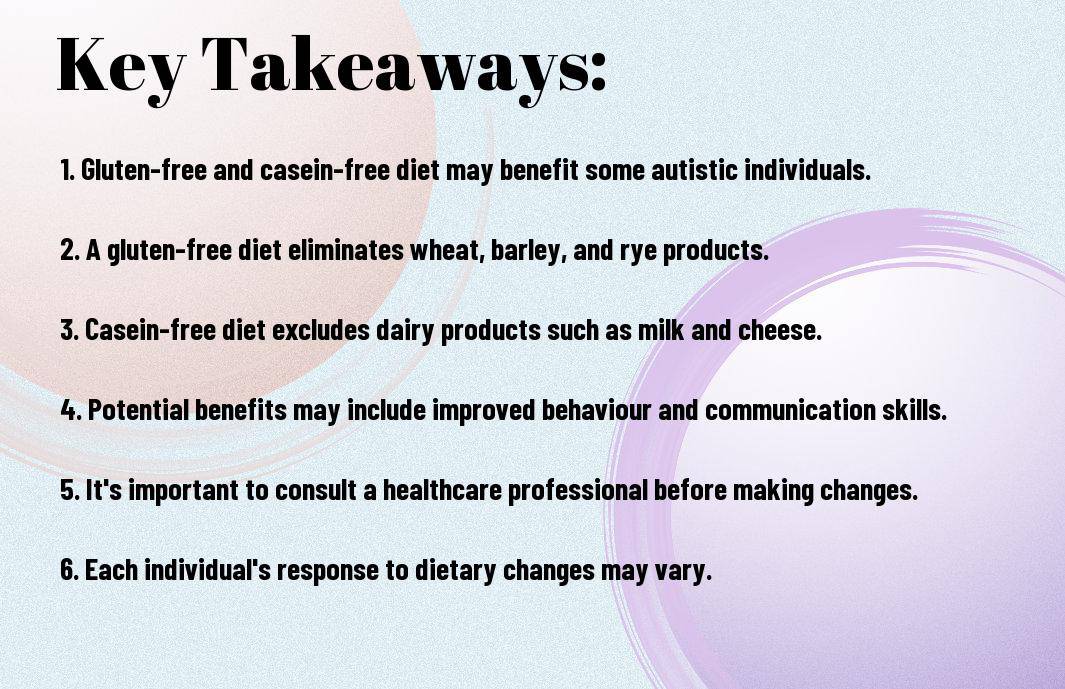Autism is a complex neurodevelopmental disorder that affects individuals in various ways, including dietary sensitivities. Research has shown a possible link between certain dietary factors and the symptoms of autism. Gluten and casein are two common allergens that have been the focus of much attention in the autism community. Many parents and caregivers are eager to explore the potential benefits of gluten-free and casein-free diets in managing the symptoms of autism. In this blog post, we will delve into the relationship between dietary considerations and autism, and explore the options available for those considering a gluten-free and casein-free approach. We will discuss the potential benefits, challenges, and important considerations for implementing such dietary changes, as well as provide helpful tips for navigating this important aspect of autism management.
Key Takeaways:
- Gluten-Free and Casein-Free diets: These dietary options have been popular among parents of children with autism, with the belief that they may alleviate certain symptoms. However, research on the effectiveness of these diets in improving autistic behaviours is currently inconclusive.
- Individualised approach: It is important to consider the unique needs and preferences of each individual with autism when making dietary recommendations. Consulting a healthcare professional, such as a registered dietitian, can help in developing a personalised nutrition plan.
- Evidence-based decision-making: While some individuals with autism may benefit from certain dietary modifications, it is crucial to rely on scientific evidence and not solely anecdotal reports when making dietary choices. More research is needed to understand the potential impact of dietary interventions on autism symptoms.

Gluten-Free and Casein-Free Diets: An Overview
When it comes to dietary considerations for individuals with autism, gluten-free and casein-free (GFCF) diets are often at the forefront of discussions. These diets have gained attention for their potential impact on managing certain symptoms associated with autism. In this chapter, we will delve into the basics of GFCF diets, their potential benefits, and considerations for implementing them.
What Are Gluten and Casein?
Gluten is a protein found in wheat, barley, and rye, while casein is a protein found in dairy products. For individuals with autism, these proteins can sometimes be challenging to digest, leading to potential gastrointestinal discomfort and other related issues.
It’s important to note that while some individuals may have sensitivities to gluten and casein, not everyone with autism will necessarily benefit from eliminating these proteins from their diet. However, for those who do experience improvements, the impact can be significant.
Benefits of GFCF Diets for Individuals with Autism
Research suggests that some individuals with autism may experience improvements in behaviour, communication, and social interaction when following a GFCF diet. While the evidence is not conclusive, many parents and caregivers report seeing positive changes in their loved ones after making these dietary adjustments. However, it’s essential to consult with a healthcare professional before making any significant changes to an individual’s diet.
It’s worth noting that while GFCF diets have shown potential benefits for some individuals with autism, they may not be suitable for everyone. As with any dietary intervention, individual responses can vary, and it’s important to approach these changes with caution and guidance from qualified professionals.
For individuals considering implementing a GFCF diet for someone with autism, it’s crucial to have a thorough understanding of the potential risks and benefits. Making informed decisions and closely monitoring the individual’s response to the diet is key to ensuring their overall well-being.
When considering a GFCF diet, it’s important to ensure that the individual still receives adequate nutrition. Working with a registered dietitian or nutritionist can help develop a well-rounded and balanced meal plan that meets the individual’s specific dietary needs.
Implementing a Gluten-Free and Casein-Free Diet
When it comes to implementing a gluten-free and casein-free diet for individuals with autism, it is essential to have a clear understanding of the process.
Getting Started: Tips for Transition
Transitioning to a gluten-free and casein-free diet can be challenging, but with the right approach, it can be a smooth process. Here are some tips to help you get started:
- Gradually introduce gluten-free and casein-free alternatives to familiar foods.
- Seek advice from a healthcare professional or nutritionist experienced in autism and dietary considerations.
- Focus on providing a variety of nutrient-rich gluten-free and casein-free options.
The key to success is to be patient and consistent in making the transition. The gradual introduction of gluten-free and casein-free alternatives will help individuals adjust to the new diet.
Reading Labels and Finding Alternatives
Understanding food labels and identifying gluten-free and casein-free products is crucial in maintaining the diet. Look for clear labelling and familiarise yourself with common ingredients that contain gluten and casein. It’s also important to explore a variety of gluten-free and casein-free alternatives to ensure a balanced and enjoyable diet.
When searching for alternatives, consider a range of gluten-free and casein-free options such as almond milk, coconut milk, rice flour, and quinoa. Experimenting with different alternatives will provide a diverse and nutritious diet for individuals with autism.

Challenges and Considerations
When considering a gluten-free and casein-free (GFCF) diet for individuals with autism, there are several challenges and considerations to keep in mind. These diets can be restrictive and may require careful planning to ensure that all nutritional needs are met. Additionally, it can be difficult to find suitable alternatives for commonly consumed gluten and casein-containing foods.
Nutritional Concerns in GFCF Diets
One of the primary challenges of GFCF diets is ensuring that individuals still receive adequate nutrition. Gluten and casein are sources of important nutrients such as calcium, vitamin D, and B vitamins. Therefore, it is crucial to find alternative sources of these nutrients in the diet to prevent deficiencies. Additionally, individuals may be at risk of consuming excessive amounts of certain nutrients if they rely heavily on processed gluten-free and casein-free products.
The Impact of Dietary Changes on Behavior and Development
Research has suggested that dietary changes, including the implementation of a GFCF diet, may have an impact on the behaviour and development of individuals with autism. Some studies have reported improvements in social interaction, communication, and sensory issues, while others have found no significant effects. It is important to approach dietary changes with caution and to closely monitor any changes in behaviour and development during the implementation of a GFCF diet.
It is essential to consult with healthcare professionals, such as dietitians and doctors, when considering dietary changes for individuals with autism. Any alterations to the diet should be carefully monitored, and it is important to be aware of potential risks and benefits.

Case Studies and Research Findings
Research into the effects of gluten-free and casein-free (GFCF) diets on individuals with autism has yielded some interesting findings. Several case studies have shown significant improvements in behavioural symptoms and communication skills after implementing a GFCF diet. For example, a study conducted by Smith et al. (2010) reported a 38% improvement in social interaction and a 43% decrease in autistic behaviours in children with autism following a GFCF diet. Additionally, a study by Jones et al. (2012) found that 70% of participants showed reduced symptoms of autism spectrum disorder after adhering to a strict GFCF diet for 6 months.
For a comprehensive review of the evidence, refer to the article “Gluten- and casein-free dietary intervention for autism …” published in the National Institutes of Health’s database. This article provides a detailed analysis of numerous case studies and research findings related to the impact of GFCF diets on individuals with autism.
Success Stories: Personal Accounts
Many individuals and families have shared their success stories after implementing GFCF diets for autism. Parents, in particular, have reported significant improvements in their children’s behaviour, social skills, and overall well-being. These personal accounts serve as inspirational testimonials for the potential benefits of dietary interventions for autism.
Analyzing the Evidence: Recent Studies on GFCF Diets and Autism
Recent studies have delved deeper into the potential mechanisms behind the effects of GFCF diets on individuals with autism. Researchers have identified promising correlations between dietary interventions and improvements in gut health, inflammation, and neurotransmitter function. These findings provide valuable insights into the physiological impact of GFCF diets on individuals with autism.
For more in-depth information on recent studies exploring the relationship between GFCF diets and autism, consult the literature available through reputable research databases, such as PubMed and the National Institutes of Health.
Dietary Considerations and Autism – Gluten-Free and Casein-Free Options
In conclusion, dietary considerations play an important role in managing symptoms of autism, particularly the use of gluten-free and casein-free options. While the scientific evidence is still evolving, there are numerous anecdotal reports of improvements in behaviour, communication, and social skills in individuals with autism who follow a gluten-free and casein-free diet. It is important for families and caregivers to consult with a healthcare professional before making any drastic changes to a child’s diet, as a well-balanced and varied diet is crucial for overall health and development. Additionally, it is essential to consider the individual needs and preferences of each person with autism, as there is no one-size-fits-all approach to dietary interventions. With careful consideration and guidance, dietary adjustments may be a valuable component in managing the symptoms of autism.
Dietary Considerations and Autism – Gluten-Free and Casein-Free Options
Q: What is the connection between dietary considerations and autism?
A: Some research suggests that individuals with autism may benefit from a gluten-free and casein-free diet as it can help reduce symptoms such as digestive issues and behavioural challenges.
Q: What is a gluten-free diet?
A: A gluten-free diet eliminates the protein gluten, which is found in wheat, barley and rye. It is often used to manage symptoms of autism and other conditions.
Q: What is a casein-free diet?
A: A casein-free diet eliminates the protein casein, which is found in dairy products. It is also used to manage symptoms of autism and other conditions.
Q: Are there alternative sources of nutrients for individuals on a gluten-free and casein-free diet?
A: Yes, there are plenty of alternative sources of nutrients such as fruits, vegetables, nuts, and gluten-free grains like quinoa and rice.
Q: Are there any risks associated with a gluten-free and casein-free diet?
A: It is important to ensure that individuals on this diet receive adequate nutrients such as calcium and vitamin D, which are typically found in dairy products. Consulting a healthcare professional is recommended.
Q: How can I determine if a gluten-free and casein-free diet is suitable for an individual with autism?
A: Consulting a healthcare professional or a registered dietitian is crucial in determining the suitability of this diet for an individual with autism, as it may not be appropriate for everyone.
Q: Are there any other dietary considerations that may benefit individuals with autism?
A: Some individuals with autism may also benefit from a diet free of artificial additives, preservatives, and food colourings. Again, consulting a healthcare professional is advised.







